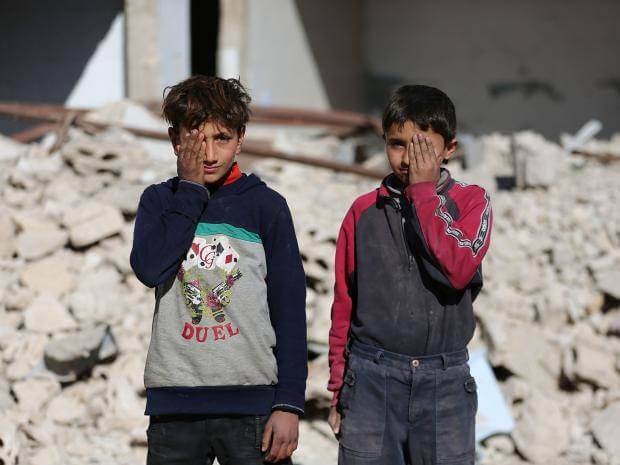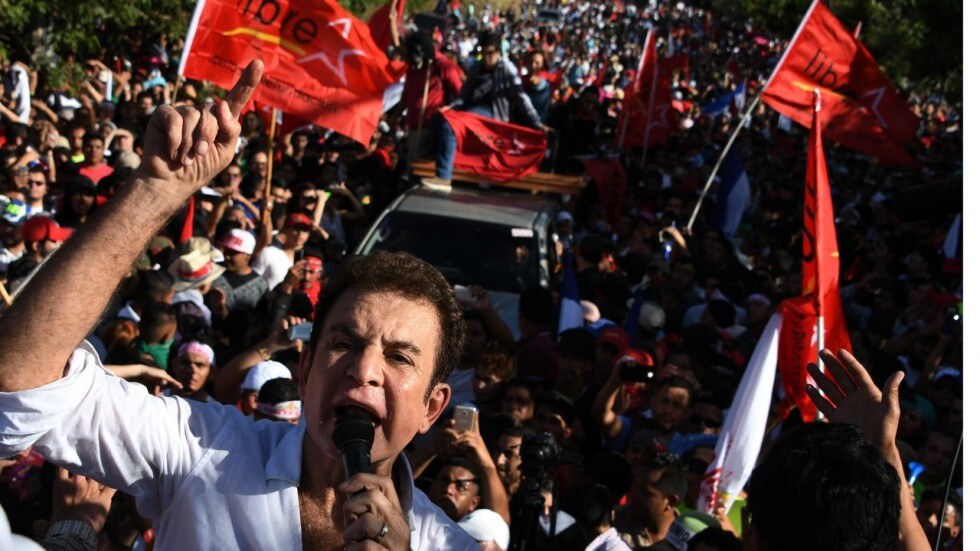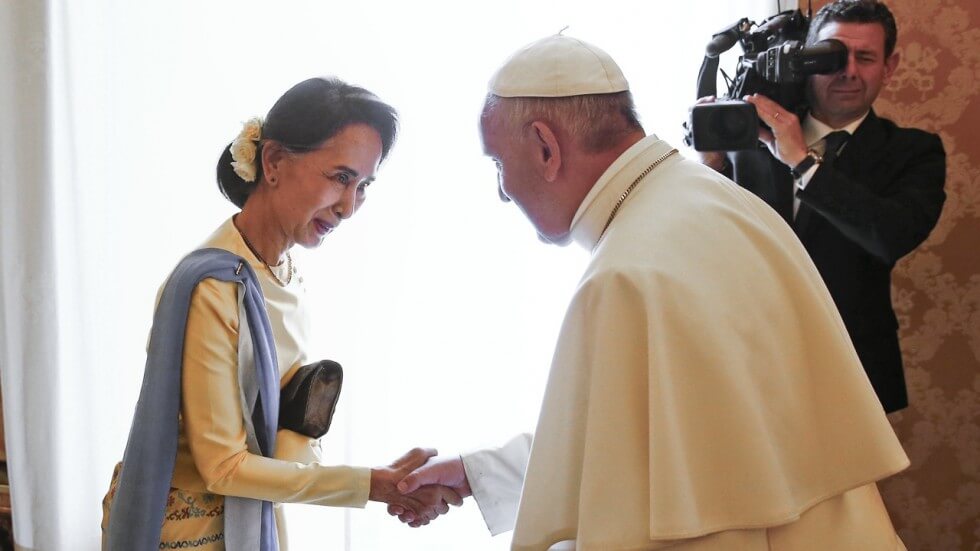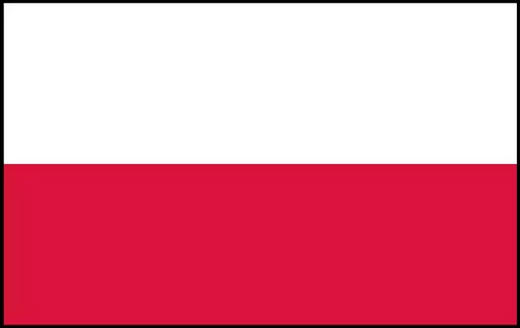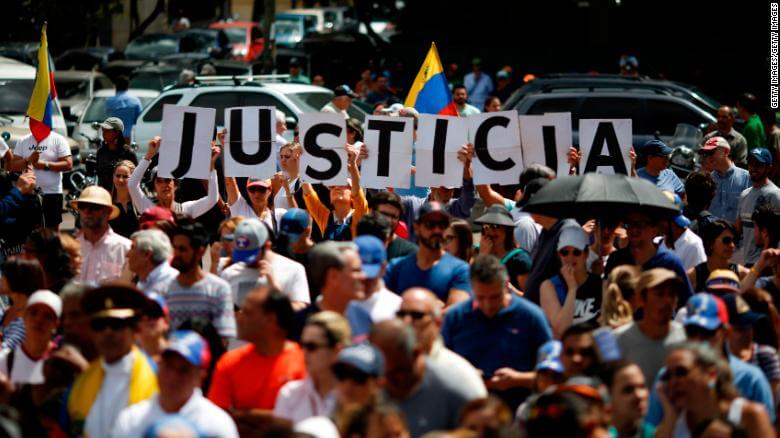
Photo: “Demonstrators clash with the Bolivarian National Police during a protest in Caracas, Venezuela, April 10, 2017.” (AP, via VOA.com)

Venezuela
Tensions from 2016 continued and on 30 March 2017, the Venezuelan Supreme Court decided to take over legislative powers from the National Assembly (NA). This decision triggered widespread protests and the court quickly reversed its decision on April 1st. Nevertheless, protests continued almost daily for over three months. Protests regularly included violence and led to clashes between young protesters and the National Guard, causing the death of about 120 people this year. Critics did not only come from the opposition blaming the government for increasing autocratic tactics, but also from within the chavista ranks, formerly loyal to Maduro.
Amidst growing pressure, President Maduro announced the decision to call for a new constitution “saying it was the ‘only road to restore peace’ in the country“, and the establishment of a Constituent Assembly (CA) to draft the new constitution. The opposition which largely criticized the President’s intentions then organized a symbolic and unofficial referendum against the plan. While it coincided with a trial-run for the official July 30-vote for the new CA, the opposition’s unofficial referendum produced high turnouts, showed large rejection of the government’s plan and raised hopes for further pressuring the government.
However, the CA was eventually created in a controversial vote, criticized for being illegitimate and boycotted by the opposition. Large numbers of security forces had appeared to overlook the election sites, but also at protests – peaceful and violent – which were repressed violently with no tolerance for the pro-democracy demonstrators. The new pro-government assembly then went on to replace and take over the powers of the elected NA. This was deemed “illegal and unconstitutional”, also by international actors, especially the US which called the vote a ‘sham’ and Maduro a ‘dictator’, introducing financial sanctions against the country.
Despite the protests earlier this year, Venezuela’s opposition coalition partly faces distrust and has suffered from internal divides. In November, regional gubernatorial elections did not bring results in favor of the opposition as had been expected before, causing outcry by the opposition. Most recently, President Maduro banned three of the main opposition parties from participating in next year’s presidential election after a boycott of mayoral polls earlier in December, saying he was following criteria set by the CA. “The presidential vote had been scheduled for December 2018, but analysts say it could now be brought forward.” This brings the opposition into deeper crisis, after it had even been awarded the Sakharov Prize for Freedom of Thought by the European Parliament. Several rounds of talks between the opposition and government in the Dominican Republic have failed to reach an agreement and are set to resume in January.
Like Venezuela’s (former) chief prosecutor and government critic Luisa Ortega Diaz or ousted Caracas mayor and opposition leader Antonio Ledezma, many Venezuelans are fleeing the country due to the crackdown on political dissent as well the deteriorating economic situation and humanitarian crisis. Venezuela’s economy strained by falling oil prices, subject to hyperinflation, sanctions and its failure to repay government debts, have led to shortages of food and medicine in the country. Widespread violence and crime have joined these problems. In response to economic consequences of sanctions, Maduro also announced the launch of the “Petro”, a digital cryptocurrency.
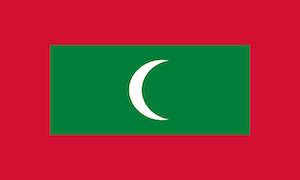
The Maldives
Early 2017, Former president of Maldives Mohamed Nasheed claimed that he wants to run for office again. Where Nasheed´s return would not be without a risk, the move would have proven a good step towards uniting the broad coalition of opposition-groups and coming out with a single candidate. In the remainder of the year, however, things went silent around Nasheed´s return. For the Maldives, 2017 was another year of aggravating government authoritarianism.
In April, a prominent blogger was stabbed to death in capital Male. Yameen Rasheed ran a blog called “The Daily Panic”, known for ridiculing the countries politicians, both ruling party and opposition. Rasheed was not the first media figure to be targeted in the Maldives, but so far all cases go unsolved. Besides guessing what the motives for these murders were, they have been said to “represent a new type of violence” in the Maldives that follow a new type of violent discourses, related to the country’s political context, and “thrive on the failure of its non-religious politics, as well as its fragmented religious landscape.” The murder even brought UN High Commissioner for Human Rights Zeid Ra’ad Al Hussein to urge for a swift and thorough inquiry into the killing, connecting the act to an upsurge in arrests and prosecutions of the political opposition.
Over the last year, however, space for legitimate dissent has been shrinking at alarming speed. The government of President Abdulla Yameen intensified its crackdown on the rights to freedom of expression and of peaceful assembly. Authorities used new laws and criminal cases to silence political opponents, as well as human rights defenders, journalists and civil society. Halfway August, the Maldivian military locked down the country’s parliament, in what opposition lawmakers said was an attempt to hold them from voting on a motion to impeach the speaker of the house. Only a month before, a similar scenario played out, as the armed forces padlocked the gates of parliament to prevent another attempt at impeachment, in which the opposition said it had the majority of votes.
Also in 2017, the Maldives announced the reintroduction of the death penalty after a 60-year moratorium. The Yameen government claimed the measure was necessary to try and reduce the rising number of murders and stop drug-trafficking. Amnesty International has stated that the executions are a ploy by the government to distract attention from its own problems and ensure its political survival.
Lack of independence of the judiciary remained a concern, as it is said to be highly influenced by the country’s President. In September of this year, the Department of Judicial Administration suspended at least 54 lawyers and charged them with contempt of court, after they filed a petition demanding the rule of law in the country. Corruption, finally, also played a salient role in the Maldives this year. After Al Jazeera exposed how Yameen and his former deputy coordinated the theft of millions of dollars from state coffers, the President admitted receiving bags of stolen cash at his private residence, but has not been prosecuted since.

Zimbabwe
The first months of 2017 in Zimbabwe are characterized by two things. First, there is a degenerating political, social and economic situation in the country which is not adequately addressed by its ruling elite. Despite the fact that Robert Mugabe called Zimbabwe the second-most developed country in Africa, the country was struggling with deadly floods, Air Zimbabwe was struggling to keep afloat, and protesters had to face harsh reprisals. The country also faced shortages of fuel and basic commodities over the course of the year. Government repression continued unabated throughout 2017. After the introduction of a new ministry responsible for Cyber Security, the Zimbabwean police charged an American woman over a tweet that appeared to insult President Robert Mugabe early October.
Secondly, both ZANU-PF as well as the political opposition seems to be more busy with internal alliances and disputes than guiding their country. Especially the factionalism within the ruling party takes over the headlines. The so called ‘G-40’-faction, representing the younger generation within ZANU-PF, supports Mugabe’s wife Grace to succeed her husband. On the other hand, there is the so called ‘Team-Lacoste’-faction, which backs up Vice-President Mnangagwa as Mugabe’s successor for party-leadership.
Then, seemingly out of nowhere, the military takes over Zimbabwe. After Zimbabwe’s army chief Constantino Chiwenga demanded a “stop” to the purge in the ruling party on November 13th, soldiers take over Harare the next day. Military spokesman, Major General SB Moyo makes the announcement that the military has temporarily taken control of the country to “target criminals” around President Robert Mugabe, but that the President and his family are “safe and sound and their security is guaranteed”. After a week of negotiations, Robert Mugabe announces his resignation, after 37 years as the leader of Zimbabwe, sparking massive celebrations all over Zimbabwe.
Former Vice-President Emmerson Mnangagwa, who was sacked early November, is put forward by the party as their new leader. After his inauguration at the end of November, the new President has been trying to re-engage with those who can help him to stabilize the Zimbabwean economy: the international community, foreign investors, and white farmers. Despite a promising new budget statement, the removal of Zimbabwe’s corrupt police, and the acquaintance of several social movement leaders, skepticism remains, especially because of the deeply ingrained system of patronage that was built in 37 years under Mugabe. The opposition, shut out of Mnangagwa’s Cabinet in favor of military and ruling party members, now seems to focus on the 2018 elections.

The United States of America
This year, the US did not only witness natural disasters like wildfires or Hurricane Harvey, it also experienced two of its deadliest shootings in history. In October, a gunman fired into the crowd at a Las Vegas music festival, killing 58 and leaving hundreds injured. Only a month later, a man opened fire in a Sutherland Springs, Texas, church, killing 26 and injuring 20 more.
Besides these tragedies, the US experienced political tensions surrounding Donald Trump’s first year of presidency. At the beginning of 2017, the history Women’s March brought one million people to the streets of Washington DC and more around the world, showing their discontent with the new president’s inauguration. But other protests throughout the US took place during the course of the year as well. One of the most prominent incidents in 2017 in which Donald Trump received criticism, was his initial reaction and – as perceived by many – lack of harsh condemnation of the events in Charlottesville in August. White supremacists planned to protest the removal of a Confederate icon statue on August 12th which was described as “one of the largest white supremacist events in recent US history”, when people also marched through the streets with burning torches, chanting slogans like “white lives matter” and “blood and soil”. Protests turned violent when white supremacists and nationalists clashed with counter-demonstrators, and a car driven into the crowd killed one and injured many others. CANVAS also followed the protests of professional athletes, especially in the NFL, kneeling during the national anthem seeking to raise awareness for racial injustice. While some supported the athletes, others opposed their protests, including President Trump, as they were perceived as being disrespectful to the anthem and the US.
Another topic which generated repercussions not only in the US but also around the world, was what became known as the #MeToo-campaign. After actress Alyssa Milano shared her account of sexual harassment by Hollywood producer Harvey Weinstein, other high-profile accounts and accusations“about the pervasice damage wrought by sexual harassment” joined her. This “created a wave of awareness and brave confrontations over sexual harassment and assault, taking down powerful men in the process.” Time magazine even went on to name the #MeToo movement ‘Person’ of the Year 2017. Recent elections in Alabama were widely followed in this context as well, as controversial Republican Candidate Roy Moore was accused in various cases of sexual misconduct against teenage girls. The election surprisingly resulted in a Democratic win in the southern state.
Heightened tensions and reciprocal threats between the US and North Korea have raised fears of (nuclear) escalation on the Korean Peninsula, especially after repeated ballistic missile tests. On the international stage Donald Trump’s recent announcement to recognize Jerusalem as Israel’s official capital and to move diplomatic representations to the city, has led to widespread condemnation. The move which sparked protests and clashes in the Palestinian territories and beyond, has most recently been condemned by the UN General Assembly and “’demanded’ that all countries comply with Security Council resolutions regarding the status of Jerusalem”.

Syria
For Syria, the country that has been in war for more than 6 years now, this year was one in which the international superpowers played a game of chess on its future, while close to ten thousands of its people died in the meantime. Hopes of greater democracy and openness have been mostly replaced by chaos and violence, with the Syrian president Bashar al-Assad and his backers largely back in control of the main urban centers. The war is likely to go on for years and many millions of refugees who fled to neighboring countries are not yet able to return.
After the balance of power slowly but steadily shifted towards Assad late 2016, in January, Russia, Iran and Turkey agree to enforce a ceasefire between the government and non-Islamist rebels, after talks between the two sides in Kazakhstan. Early March, Russia and China veto a UN resolution to impose sanctions on Syria over the alleged use of chemical weapons. After the election of Donald Trump as the new US-President, the United States of America intervenes in Syria, directly targeting Syrian military positions for the first time. In April, Trump orders a missile attack on an airbase from which Syrian government planes allegedly staged a chemical attack on the rebel-held town of Khan Sheikhoun.
Throughout the year, diplomatic efforts to restore peace in Syria continue in both Geneva and Astana. After six years of war, the US and Russia agree to a limited ceasefire in three war-torn provinces in southwest Syria, in July. 2017 ends with the collapse of the eighth round of UN-sponsored talks in Geneva designed to end the Syrian civil war, as those who represent Assad are unwilling to meet anyone with a different opinion, according to the Guardian.
In the meantime, the battle against Islamist groups continued throughout 2017. ISIS was pushed back heavily throughout the year. In May, President Trump approves military plans to arm the Kurdish YPG as part of the effort to retake the Syrian city of Raqqa from IS militants, in a move which infuriates NATO-ally Turkey. After conceding defeat to the Syrian regime in Palmyra early March, the Islamic State group is driven from Raqqa, its de-facto capital in Syria in October. One month later, the Syrian army also takes full control of Deir al-Zour from Islamic State.
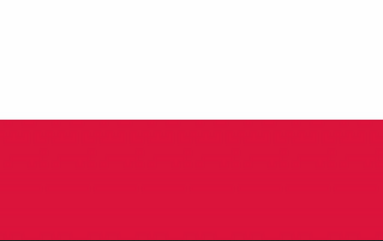
Poland
For Poland, 2017 was a year of deteriorating democracy and strong efforts to counter this dynamic. Continuing from 2016, Poland’s governing Law and Justice party (PiS), in office since 2015, is seen to slowly destroy the pillars under the Polish democracy. Polish public television is turned into a platform for ruling party propaganda, and the country’s constitutional court has effectively been brought under the control of justices close to the ruling party. Meanwhile, Poland also had to deal with the rising far-right movement in the country. In November, white supremacist and racist views were expressed by some of the 60,000 people who took part in a march on Poland’s Independence Day.
The European Union tries to do all it can to curb Poland’s efforts to turn away from democracy. According to the EU, serious questions have to be raised about the effective application of EU law, in the absence of judicial independence. Poland and the EU also clashed over the logging in Poland’s Bia?owie?a forest. The EU imposed a ban on logging in the primeval woodland, which was subsequently ignored by the Polish authorities. Only ten days before the end of the year, the European Commission triggered the so called Art. 7-procedure, which could result in the suspension of Poland’s voting rights in EU institutions, and block EU financial transfers. While these measures require unanimity among member-states, the outcome is unlikely, but it is telling for Poland’s direction in 2017. The EU’s interference could count on the support of a big part of Polish society, it also came across severe protest of those citizens supporting Polish conservatives.
Meanwhile, the Polish citizens have proved very effective in mobilizing and organizing against the state. In July, two new legislative bills caused eight days of mass mobilization across the country, in which hundreds of thousands of Poles took to the streets in capital Warsaw, as well as hundreds of other towns and cities, and held vigils in front of courthouses. Polish president Andrzej Duda eventually moved in to veto the two bills that sparked protests throughout the nation. The bills were meant to bring the Polish Supreme Court under control of the ruling party, and would allow the Ministry of Justice to appoint judges.
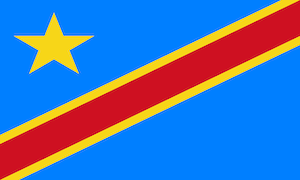
Democratic Republic Congo
For DRC, 2017 is mainly another year of unrest, violence and instability. The violence in Kasaï was perhaps 2017’s biggest news story. The Wire reports that in Kasai, “little children were being hacked to pieces with machetes.” The south and northeastern parts of the DRC also witnessed deadly conflict in 2017. There was major fighting between the local Twa and Bantu populations in Tanganyika province. Uvira, on the outskirts of Lake Tanganyika, was the site of a battle between the rebel Yakutumba militia and government forces in September. Early December, 14 Tanzanian UN peacekeepers and five Congolese air force members are killed in the Democratic Republic of the Congo in the “worst attack in recent history”, as stated by the UN.
President Joseph Kabila has succeeded in ignoring the request for elections in 2017. The President, who was originally supposed to step down at the end of his term in November 2016, is clinging on to power, and suppressing dissenting voices. Early 2017, DRC got to deal with another disappointment, after the deal the Catholic Church thought that it had reached with Kabila that would deny him a third term, collapsed. In February, long-standing opposition figure Étienne Tshisekedi dies, dealing a major blow to the talks between Kabila and the various opposition groups. His death deprived the opposition of its principal figure-head, who could mobilize popular support as well as cut political deals in Kinshasa. After negotiations in which the UN plays a role, new elections have now been planned not earlier as December 2018, which the opposition movement seems to find hard to accept.
Meanwhile, the humanitarian crisis in DRC has outpaced Syria, Yemen and Iraq in the number of people forced to flee. Averages of 5,500 people a day were being uprooted from their homes because of violence and insecurity, in the first half year of 2017. Following failed attempts to organise elections at the end of this year, analysts have forecast that postponing the elections is likely to incite grievances among communities in Congo, which may be used by armed groups to muster support into 2018. As the year is coming to an end, there seems to be little hope of a resolution to the major crises that have intensified over the past 12 months. The violence in Kasai is escalating and the conflict in south eastern Congo looks set to continue.

Cambodia
Towards the 2018 elections, Prime Minister Hun Sen seems to intensify his efforts to silence every form of political dissent against his rule. After coming close to defeat in 2013, the ruling Cambodian People’s Party (CPP) has since cracked down on any form of political dissenting, or dissenting voices. In 2017, the CPP arrested key political figures and members of civil society, cracked down on independent media platforms, and eventually dissolved the main opposition party.
Over the course of the year, independent media have been silenced. Halfway 2017, the Cambodian government launched a systematic attack aimed at independent media in the country. At least six media outlets (one daily newspaper, two foreign media services and three local radio stations) were shutdown, forced off the air, or facing closure. A staggering $6.3 million tax bill forced the Cambodia Daily to close , and radio stations carrying programs from Voice of America and Radio Free Asia were shut down for supposed technical and administrative violations. ASEAN lawmakers from around Southeast Asia expressed grave concern about the status of independent media outlets and civil society organizations in Cambodia.
Police arrested Cambodia National Rescue Party leader Kem Sokha over allegations of treason in September, with Prime Minister Hun Sen accusing the opposition president of conspiring with the United States to oust his regime. Where the main opposition party initially defied Hun Sen’s threats, his words turn out to be more than bluff. After Cambodia’s main opposition-party CNRP is dissolved by the Supreme-Court halfway November, Cambodia’s ruling Party is left unopposed in Parliament. The court accepted the government’s claim that the party conspired with foreigners to stage a revolution. This harsh measure is said to have had a wider effect on the already stifling debate in Cambodian society.
Cambodia can also be seen to slowly turn towards China, turning its back on the wider international community. After the Cambodian government closed a prominent American pro-democracy organization and ordered its foreign staff to leave the country in August, the US threatened to push for travel restrictions for Cambodian top officials. Hun Sen, however, played along the power game and expressed that sanctions by Western donors don’t worry him, subsequently challenging the United States to cut all aid. Part of his lack of worries is due to his administrations strong relationship with China, which has become by far the biggest giver of foreign aid as well as the biggest investor in Cambodia.

Myanmar
For Myanmar, the international headlines were completely occupied with the Rohingya-crisis, from the start of 2017 all the way through to the end. Myanmar military’s persecution of the Muslim minority group, which is not recognized as a national ethnic group by the government, caused an international outcry. World leaders pressed the country’s leader Aung San Suu Kyi to end the persecution of religious minorities and allow aid workers full access to areas of conflict. International organizations condemned the violence, which according to them amounted to crimes against humanity and ethnic cleansing.
From September, an unprecedented refugee crisis forms in Myanmar and over the border of Bangladesh. As of October, hundreds of thousands had already fled to the neighboring country. The people have no place to return to, as the Myanmar military allegedly went on a campaign to burn entire villages. Over time, military groups emerge in Rakhine state, with the intention to fight back against what they see as decades of oppression by the Buddhist majority.
Besides the deal that was reached late November between Myanmar and Bangladesh over the terms for the return of the Rohingya Muslims from Bangladesh, so far no decisive measures have been taken. Myanmar de-facto leader Aung San Suu Kyi over the course of the year had to endure increasing criticism for her impotence or unwillingness to do anything about the crisis. She gets stripped from her Freedom of Oxford and Dublin Honors, and several voices call on the Nobel Peace Prize committee to follow these examples. At the end of the year, Myanmar blacklisted and barred UN investigator and special rapporteur on the situation of human rights in Myanmar, Yanghee Lee, from entering the country. Also at the end of the year, two Reuters-reporters get arrested in Yangon, in a case which, according to U.N. Secretary-General Antonio Guterres, is related to their reporting on the continued persecution of Rohingya Muslims in the country.
Other essential stories CANVAS has covered in 2017
Spain – The struggle for Catalan independence dominated the headlines for several weeks in 2017, and the saga is very likely to continue into 2018 – Politico
South Africa – The political party that has represented the majority of South African citizens since 1994, ANC, is getting under more and more pressure, as they elected a new leader end of the year – Guardian
Honduras – Late November, tens of thousands flooded the streets of Honduras in opposition to what has been seen as a fraudulent election, that has decided in favor of incumbent President Hernandez – New York Times
Kenya – After months of allegations, protests and violence, Kenya’s Supreme Court ruled unanimously to uphold the re-election of President Uhuru Kenyatta in October’s repeat presidential vote which opposition candidate Odinga had boycotted, dismissing two legal challenges – Reuters
Hong Kong – In 2017, protests over democratic freedom and independence in the Chinese ruled city continued – CNN
Iraq – Towards the end of 2017, the Iraqi Kurds voted for independence for their region. After weeks of reprisals and battlefield defeats, Massoud Barzani, the region’s president who led an independence push for the Kurdish region more than a decade, announced that he would quit as president – VOA
Romania – Early in 2017, Romania witnessed its biggest protests since 1989, accusing the government of corruption and putting other powers under growing government control. Recently in November, new demonstrations erupted throughout Romania and brought thousands to the streets, again. – The Guardian
Other essential stories CANVAS has covered in 2017
Spain – The struggle for Catalan independence dominated the headlines for several weeks in 2017, and the saga is very likely to continue into 2018 – Politico
South Africa – The political party that has represented the majority of South African citizens since 1994, ANC, is getting under more and more pressure, as they elected a new leader end of the year – Guardian
Honduras – Late November, tens of thousands flooded the streets of Honduras in opposition to what has been seen as a fraudulent election, that has decided in favor of incumbent President Hernandez – New York Times
Kenya – After months of allegations, protests and violence, Kenya’s Supreme Court ruled unanimously to uphold the re-election of President Uhuru Kenyatta in October’s repeat presidential vote which opposition candidate Odinga had boycotted, dismissing two legal challenges – Reuters
Hong Kong – In 2017, protests over democratic freedom and independence in the Chinese ruled city continued – CNN
Iraq – Towards the end of 2017, the Iraqi Kurds voted for independence for their region. After weeks of reprisals and battlefield defeats, Massoud Barzani, the region’s president who led an independence push for the Kurdish region more than a decade, announced that he would quit as president – VOA
Romania – Early in 2017, Romania witnessed its biggest protests since 1989, accusing the government of corruption and putting other powers under growing government control. Recently in November, new demonstrations erupted throughout Romania and brought thousands to the streets, again. – The Guardian
